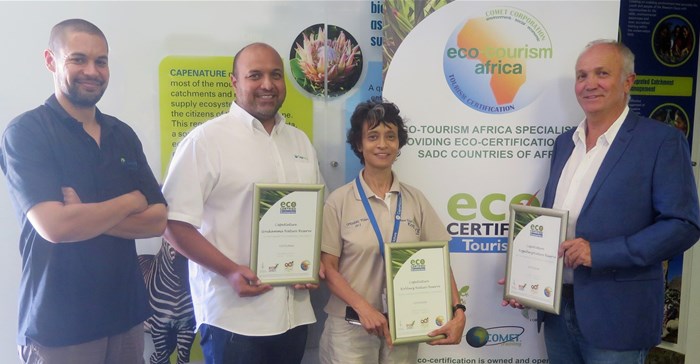In a first of tourism products in South Africa and the Southern African Development Community (SADC), CapeNature's Kogelberg, Robberg and Goukamma Nature Reserves have been awarded the ECO Certification by Ecotourism Australia.

From left to right: CapeNature tourism manager Ramese Mathews, CapeNature executive director: marketing an eco-tourism Sheraaz Ismail, CapeNature chief executive officer Dr Razeena Omar, Comet Corporation managing director Bruce See (representing Eco-tourism Africa).
Ecotourism Australia is represented in southern Africa through an exclusive agreement with Eco-tourism Africa, a COMET Corporation initiative. The ECO Certification Program was developed to address the need to identify genuine nature and ecotourism operators and is guided by the Global Sustainable Tourism Council (GSTC) criteria.
A commitment to sustainable practices
Says CapeNature CEO, Dr Razeena Omar: “Ecotourism is very important to advance the sustainability of CapeNature. The valuable role of tourism is widely recognised in the organisation and is receiving the necessary attention and support.”
The ECO Certification program assures travellers that certified products are backed by a strong, well-managed commitment to sustainable practices and provides high-quality nature-based tourism experiences.
ECO Certification is product-specific and the following CapeNature products have been certified:
• Goukamma Nature Reserve for its self-catering accommodation;
• Kogelberg Nature Reserve for the Oudebosch self-catering accommodation, its hiking trails and birdwatching available at the Stony Point penguin colony; and
• Robberg Nature Reserve for its array of hiking trails.
Leveraging natural assets
Chief Executive of Ecotourism Australia, Rod Hillman, says: “This is a significant achievement and a clear demonstration to CapeNature’s stakeholders that the Goukamma, Kogelberg and Robberg Nature Reserves are responsible members of South Africa’s tourism industry who have embraced the principles of ecotourism to bring benefit to the community, the culture and to the environment whilst providing enjoyable and meaningful experiences for their visitors.
Dr Omar adds: “As the custodians of the Western Cape’s biodiversity, we recognise the need to develop products and recreational activities which leverage our natural assets in such a way that protected areas become sought after tourist destinations, and become more accessible and attractive to a greater portion of the population.”









































